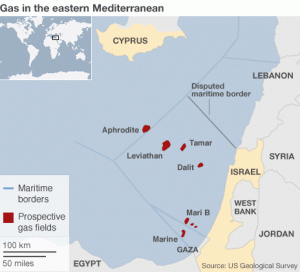
June 26 2013
The recent discovery of natural gas reserves in the eastern Mediterranean Sea has the potential to increase the complexity of the quagmire that is already the security situation in the region.
Greece, Turkey, Cyprus and Israel are amongst the nations to have already issued statements asserting control of the reserves. Lebanese Hezbollah and Hamas are other important organizations that have also claimed rights.
In the Middle East, a region with historical tensions that go back millennia, all it takes is a potentially lucrative natural resource discovery to ignite conflict once again. In the midst of several revolutions and a civil war, this find adds yet another aspect to an area that faces severe long-term security risks. The constant presence of world-powers with regional interests doesn’t make things any easier, either.
Thus far, Israel has gone the furthest in exploiting the reserves, which has incited the ire of many of it’s perennial regional foes. In close partnership with a U.S.-based energy firm, Nobel Energy, an Israeli company, Delek Energy, discovered gas off the country’s coast in 1999.
Although the original fields have run dry, the discovery of two new gas fields in the north of Israel’s exclusive economic zone have completely changed the country’s energy dependencies. An exclusive economic zone is a maritime area, established by the United Nations, that belongs to a specific country. The state that it belongs to has special rights over the exploration and use of natural resources found within the exclusive economic zone.
While it used to rely on imports to supply its natural gas, the discovery of these new fields allows Israel to become entirely self-reliant for natural gas energy production. With the even more recent discovery of a third large field, Israel could even become a natural gas exporter, which is a significant change to its strategic posture.
Although Israel’s claims have so far been deemed legitimate, neighbors such as Lebanon have lightly challenged some of the discoveries. Should a cross-maritime-border reserve be discovered, significant disputes may follow. In addition, non-government organizations such as Hezbollah may feel less obliged to follow international law and could potentially target Israeli maritime facilities for attacks.
Israel’s complicated and tension filled relationship with Palestine complicates their reserves in the south of their exclusive economic zone (EEZ). Because some of the reserves are located in waters that count as Gaza’s EEZ, Palestine has made a claim to the reserves. Although Gaza has been controlled by Palestine for years, Israel has maintained a de facto control over the EEZ associated with Gaza. This dispute has yet to be resolved.
Turkey and Greece are also deadlocked in a separate conflict involving the island of Cyprus. A substantial natural gas field was discovered in Cyprus’ EEZ, but Turkey is trying hard to get a piece of the pie. Northern Cyprus is technically claimed by Turkey, although this is not recognized by the United Nations.
Turkey was unhappy that Cyprus went about exploring the gas fields without an agreement with Northern Cyprus and Turkey. Turkey has begun their own exploration of gas fields, which has drawn complaints from Cyprus and Greece.
Greece is also battling Turkey over hydrocarbon reserves located in a disputed continental shelf. The dispute, going back to the 1970’s, involves the huge number of islands in the Aegean Sea that belong to Greece. Many of these islands are geographically close to Turkey’s coast. While Greece has only claimed 6 nautical miles off the coast as its territorial waters, it is allowed to claim up to 12 miles, per the United Nations Convention on Laws of the Sea (UNCLOS).
Now that there is immense value in owning more of the Aegean, Greece could potentially claim what the U.N. says is rightfully theirs. It would increase their territorial claim over the sea from 43.5% of it currently to 71.5% if it extends borders. Turkish parliament has stated in the past that a move like this would be grounds for declaring war. There has been no formal action on this front, as neither Greece nor Turkey has submitted any formal declaration of an EEZ. To complicate matters further, Turkey has not signed UNCLOS.
Because of these numerous maritime disputes, and little in the way of diplomatic resolution, countries in the region are increasing the aggressiveness of their maritime border patrols. Countries throughout the region have increased the patrols of their own regions, and issued statements warning other nations not to violate their maritime borders.
This will likely trigger a mini maritime arms race, as has been see in Southeast Asia amid rising border disputes there. Israel recently ordered 4 offshore patrol boats, and Turkey plans to produce 20 patrol vessels of varying classes for their coast guard. Ankara has also initiated a $1.7 billion USD helicopter landing dock, the country’s first amphibious assault vessel. Greece and Cyprus have lagged behind in defense spending due to their unstable economic situations.
These energy-based disputes are re-igniting decade-long tensions and risk further exacerbating the already delicate security situation in the region. Furthermore, with Syria in the midst of open civil war, and Egypt teetering on the brink of the same, ungoverned maritime space may become a security concern for nations of the Mediterranean.
While piracy is an ever-present threat to ungoverned waters, other non-state actors can thrive in lawless regions of the ocean. Given the number of off-shore energy production and exploration facilities in the region, terror groups looking to harm regional actors could become a significant threat.
NATO already has a robust presence in the region, and Russia has recently committed to bolstering their fleet in the sea as well. While these international fleets provide a stabilizing presence, the situation remains delicate and looks like it will continue to be so for the forseeable future.